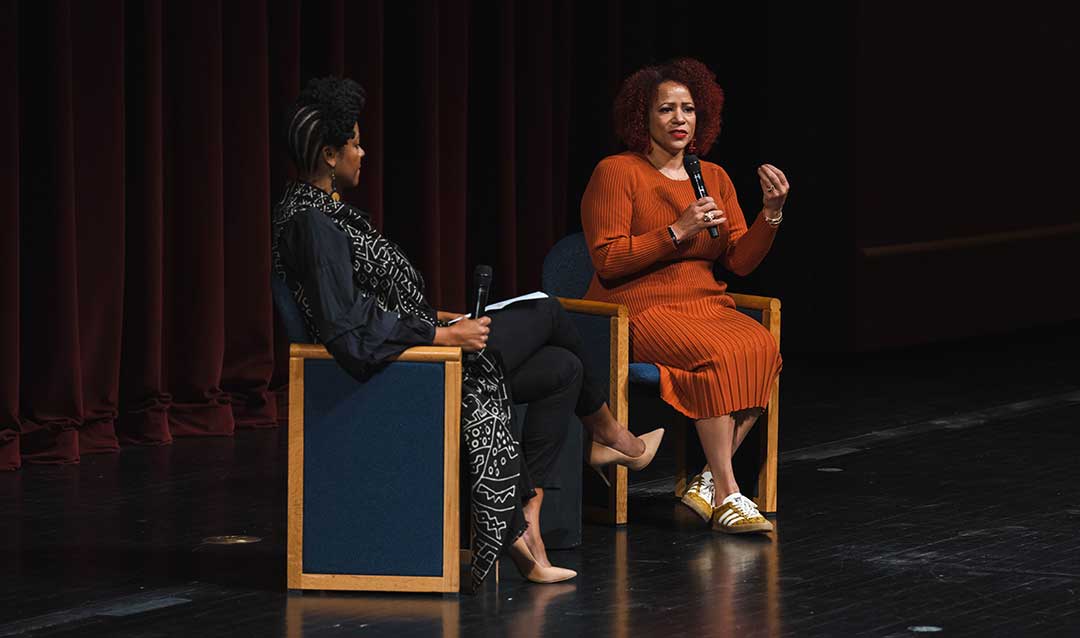It’s not every journalist who sees her work vilified to the point where politicians ban the teaching of it in schools.
Yet when New York Times staff writer Nikole Hannah-Jones, creator of "The 1619 Project," spoke at Baker Hall at the Zoellner Arts Center Tuesday evening, she managed to both joke about the backlash against it and be deadly serious about what such a response means for the country.
"The 1619 Project" was named for the year the first enslaved Africans arrived in America and was published in The New York Times Magazine in August 2019, marking the 400th anniversary of that slave ship’s arrival. The multi-media endeavor included essays, photos and art by Black American writers, activists and others.
Hannah-Jones won a Pulitzer Prize for the project, which according to the Times sought to “reframe the country’s history by placing the consequences of slavery and the contribution of Black Americans at the very center of the national narrative.” The initiative strove to show how the enslavement of Africans in the 18th and 19th centuries continues to disadvantage Black Americans today.
Later released as a book, "The 1619 Project" sparked controversy among some historians, who argued that it misrepresented the causes of the American Revolution and distorted the legacy of Abraham Lincoln, among other criticisms.
On Tuesday, Hannah-Jones told a large crowd at Baker Hall that the fallout included a majority of states passing bans on teaching the project, which was also blasted by then-President Trump. U.S. Sen. Tom Cotton and Senate Minority Leader Mitch McConnell introduced a bill to cut federal funds from any school district in the nation that taught "The 1619 Project."
“If we are, in fact, a country that can be destroyed by a single work of journalism, we weren’t that great of a country in the first place,” Hannah-Jones said to laughter from the audience.
“Healthy societies do not ban books,” she said.
“'The 1619 Project' is really about memory,” she said. “How do we collectively remember our country and understand our country? What are the things we are taught?”
Hannah-Jones argued that America wasn’t a true democracy when Thomas Jefferson wrote the Declaration of Independence in 1776. “Because we have told ourselves that we are an exceptional nation, the freest country in the history of the world. It’s right there in our founding documents: ‘We hold these truths to be self-evident, that all men are created equal, endowed by their Creator with inalienable rights' – even as the man who wrote those words owned 200 human beings at the time.”
Hannah-Jones said the U.S. has only had a true democracy since 1965 with the passage of the Voting Rights Act. At America’s founding, no women could vote and no Blacks could vote.
“The war on history is a war on democracy,” she said. “Our democracy is in danger right now.”
States have enacted more than 30 new voting restrictions since 2020, including voter ID requirements and limits on mail-in voting, according to Reuters.
Americans must refuse to give in to widespread efforts to make it harder for people to vote and refuse to be a society that takes away 50 years of reproductive freedom for women, in the wake of the Supreme Court’s overturning of Roe v. Wade, she said.
Some recent events have spurred larger portions of the public to rethink their ideas about race and racism, Hannah-Jones said.
She pointed to the May 2020 murder of George Floyd, in which Americans watched on TV as Minneapolis police officer Derek Michael Chauvin kneeled on Floyd’s neck for more than nine minutes until he died.
“We all collectively witnessed what I say without any hyperbole was the lynching of a Black man on national television,” she says. “We watched a police officer kneel on a Black man’s neck and chest until the Black man died, knowing that he was being filmed by witnesses as he did so. And people took to the street in what would become the largest protest for Black lives in the history of the world.”
That galvanized support for the aims of the Black Lives Matter movement, across a wider swath of Americans, including Republicans, Hannah-Jones said.
“Why does that matter? Because narrative drives policy,” she said.
If a majority of the public believes that Blacks are treated equally to whites, then they will see the disproportionate problems of Black Americans as their own fault, she said. But if the public sees the inequality, they will be more likely to support policies providing more opportunity to Black people.
The audience gave Hannah-Jones a standing ovation for her talk before she took questions from Terry-Ann Jones, director of the Africana studies program at Lehigh.
Asked if she was optimistic about American democracy, Hannah-Jones conceded she is not. She pointed to voter suppression efforts across the country and Republican efforts to delegitimize the results of the 2020 Presidential Election as well as recent Supreme Court rulings, including the Dobbs decision eliminating a woman’s right to abortion.
“I have been shocked over how women have laid down over this Supreme Court ruling,” she said. “I really thought that if there was going to be one thing that was going to galvanize Americans, it would be this issue. And the fact that we seem to be acquiescing so readily, doesn’t bode well to me for what we will not accept.”
“I can’t think of another time when the Supreme Court gave a right and took it away.”
Following the lecture, a discussion was held that was moderated by LaToya Council, professor of sociology and Africana studies; Monica Najar, professor of history; and John Vilanova, professor of journalism & communication and Africana studies.
-Story by Margie Peterson





